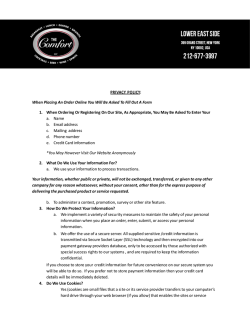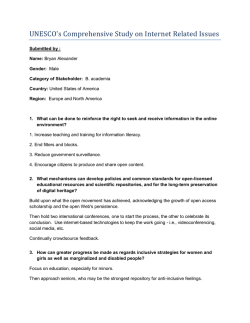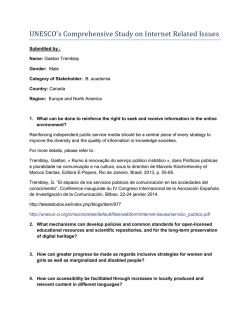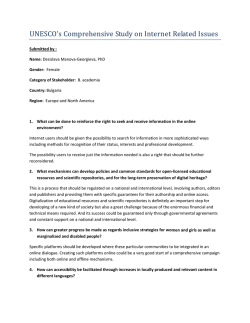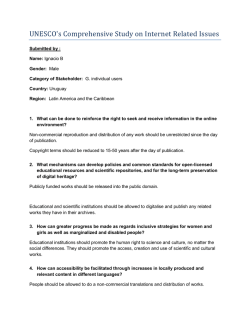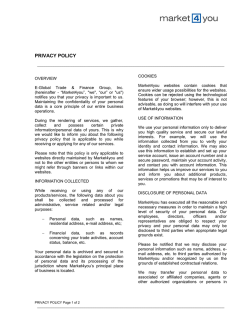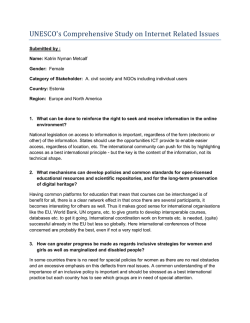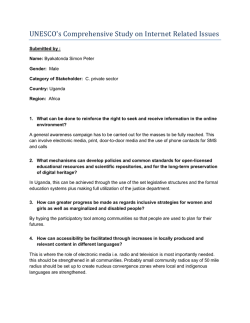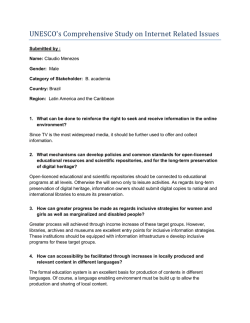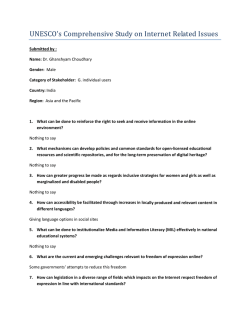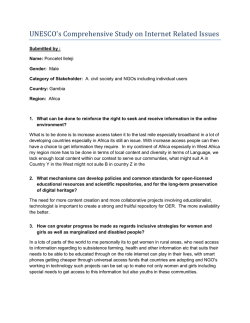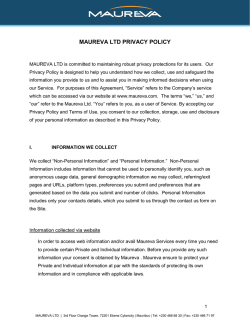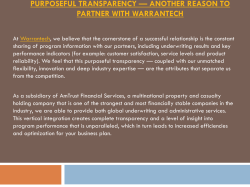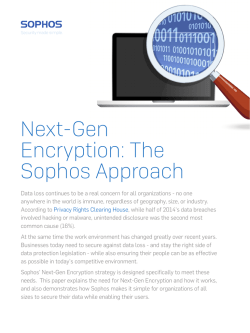
John Laprise
UNESCO's Comprehensive Study on Internet Related Issues Submitted by : Name: John Laprise Gender: Male Category of Stakeholder: B. academia Country: United States of America Region: Europe and North America 1. What can be done to reinforce the right to seek and receive information in the online environment? Facilitate the deployment of global non-terrestrial,ubiquitous wireless broadband. This will challenge efforts to censor content. 2. What mechanisms can develop policies and common standards for open-licensed educational resources and scientific repositories, and for the long-term preservation of digital heritage? Establish strong, global fair use policies for intellectual property, carving out exemptions for educational and scientific needs. Shared culture and knowledge survives and thrives. 3. How can greater progress be made as regards inclusive strategies for women and girls as well as marginalized and disabled people? Give them access to technology, especially internet-enabled smartphones and tablets which can be personalized and secured for their personal use. Such devices should have three passwords: a true password, a password that wipes and reformats the device, and a password that opens up to an innocuous, scrubbed profile. This should be standard on more devices. 4. How can accessibility be facilitated through increases in locally produced and relevant content in different languages? Encourage users to produce content though contests, prizes and other incentives. Exalt content producers. 5. What can be done to institutionalize Media and Information Literacy (MIL) effectively in national educational systems? MIL can be advanced through the global diffusion of MOOCs. Embedding MIL within the underlying instructional documentation of how to use a MOOC will institutionalize the knowledge without institutions. 6. What are the current and emerging challenges relevant to freedom of expression online? The most significant challenge is the criminalization of content; usually in a religious or political context. Such criminalization occurs usually where existing political or religious structures are perceived to be weak. 7. How can legislation in a diverse range of fields which impacts on the Internet respect freedom of expression in line with international standards? Legislation is only a solution in places with strong rule of law. Such places tend to already have strong free speech protections. The challenge is respecting freedom of expression in places with weak rule of law, where legislation is ineffective. 8. Is there a need for specific protections for freedom of expression for the Internet? No. Freedom of speech should simply be clearly defined to encompass and include online speech. 9. To what extent do laws protect digitally interfaced journalism and journalistic sources? Laws only work in strong rule of law states. Not coincidentally, such states tend to have healthy journalistic cultures. That said, state security concerns have threatened journalistic sources and journalism more broadly. Clearly identifying and asserting the importance of a free press would assist journalists in strong rule of law states. 10. What are the optimum ways to deal with online hate speech? How can Media and Information Literacy empower users to understand and exercise freedom of expression on the Internet? Ridicule. Laughter is the best medicine to cope with hate. Most hatred is based on unreason and misperception. Using humor to point out this fact gently is the best non-confrontational way to change minds. If we are empowering users, then it is important to facilitate their sense of self-efficacy. People are willing to express themselves when they believe in themselves or their cause. Encouraging users to strengthen their sense of self is crucial. 11. What are the optimum systems for independent self-regulation by journalistic actors and intermediaries in cyberspace? Internet users are evolving methods for doing exactly this. Fact checking documents and citizen journalism creates competition for professional journalists and keeps them honest. This process is early in its development but will likely accelerate. 12. What principles should ensure respect for the right to privacy? I'm not sure. I believe that the "right to privacy" is a socially constructed concept and that what constitutes this right varies from place to place and time to time. Currently, technological change is accelerating this change. Fundamentally, it comes down to what two parties deem privacy to be and mutual agreement facilitates privacy. 13. What is the relationship between privacy, anonymity and encryption? Encryption enables users to reliably communicate solely with other users they want to communicate with. Anonymity allows individuals to exercise free speech and association without fear of retribution but also enables individuals to live outside of surveillance. Given the state of technology, this latter attribute of anonymity may become, largely a historical relic. Making encryption a default standard and enabling anonymity online facilitates privacy, free speech and association. 14. What is the importance of transparency around limitations of privacy? See David Brin's "The Transparent Society" 15. What kinds of arrangements can help to safeguard the exercise of privacy in relation to other rights? Strong public scrutiny of the use of surveillance by the powerful is necessary and transparency in their actions. 16. How can openness and transparency of data be reconciled with privacy? At the individual level, openness and transparency equate to convenience. Individuals are happy to make their lives more convenient by enabling openness and transparency of their own information up until the point that they realize they are being surveilled at which point they recoil. Unfortunately, individuals are poor judges of the value of their individual data which is only valuable in aggregate. 17. What may be the impact of issues relating to big data on respect for privacy? It is unclear whether some definitions of privacy are reconcilable with big data. In a sense, big data is like the invention of the atomic bomb. World wars have become passé with the threat of nuclear weapons. Similarly, some forms of privacy may suffer a similar fate. 18. How can security of personal data be enhanced? Universal strong encryption by default coupled with strong penalties and fines for data holders and aggregators who fail to secure it. 19. How can Media and Information Literacy be developed to assist individuals to protect their privacy? Include encryption as part of the MIL curriculum 20. How can ethical principles based on international human rights advance accessibility, openness, and multi-stakeholder participation on the Internet? Principles have long term effects. In diplomatic society, once principles are agreed upon, they are largely closed for debate and tend only to be expanded, constraining state power. By making open access and some definition of privacy a human right, organizations constrain state power over time. 21. What conceptual frameworks or processes of inquiry could serve to analyse, assess, and thereby inform the choices that confront stakeholders in the new social uses and applications of information and knowledge? From history of technology: social construction of technology: it's all about the users. 22. How does ethical consideration relate to gender dimensions of the Internet? Users are users. Gender should not make a difference. The fact that it does now is the norm that we are seeking to change. Our goal should be that it does not make a difference. That is the norm we are pursuing. 23. How can ethics, - i.e. the simultaneous affirmation of human rights, peace, equity, and justice - inform law and regulation about the Internet? Ethics effectively only informs law and regulation where those tools are strong/existent. In their absence or where they are weak, the effect of ethics are also weak and it becomes an issue of brute power. 24. What international, regional and national frameworks, normative guidelines and accountability mechanisms exist of relevance to one or more fields of the study? Watch the users. When a skilled user acquires a VPN, what "flavor" internet do they seek out? Only researchers seek to access the internet in China, Russia, and Iran for instance. In many cases (with the exception of IP), users seek out the US internet because on access and expression, the US has an unrivalled position. 25. How do cross-jurisdictional issues operate with regard to freedom of expression and privacy? Cross-jurisdictional issues respect the fiction that all regimes of law are equally upright. This is highly problematic enabling persecution. 26. What are the intersections between the fields of study: for example, between access and freedom of expression; ethics and privacy; privacy and freedom of expression; and between all four elements? In a sense, this discussion is about the struggle amongst individual autonomy, societal cohesion, and state sovereignty. The internet has the potential to enhance self-efficacy. Oppressive states seek to diminish self-efficacy to minimize internal threats. The interaction between the individual and society or its character, rather defines the limits of state power. 27. What pertinent information materials exist that cut across or which are relevant to the four fields of the study? Lots. Seek out the scholars of GIGANET. They have been studying these and other phenomena since WSIS. 28. What might be the options for role of UNESCO within the wider UN system in regard to the distinct issues of online Access to information and knowledge, Freedom of Expression, Privacy and Ethical dimensions of the information society? Act to engage more state stakeholders and thereby weaken and constrain them into acting in accordance with global norms. AoC might be a good place to start. Support ITU efforts to enhance access while refraining from getting embroiled in IP discussions. 29. What might be options for the role of UNESCO in relation to stakeholders outside the UN system? Support the development of community in civil society (and individual users) to enhance its standing and voice in discussions relating to these issues. Do not worry so much about the content and direction of these organizations; support collaboration. 30. For each study field, what specific options might UNESCO Member States consider? Empower domestic users to advance policy and interact with the wider world.
© Copyright 2026
